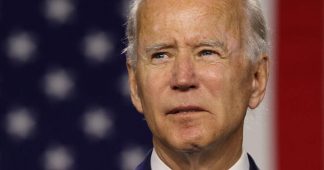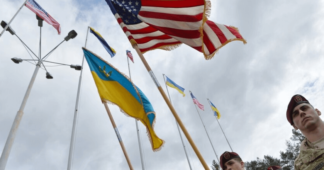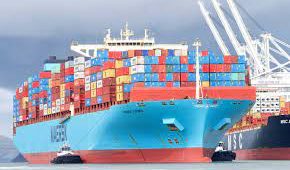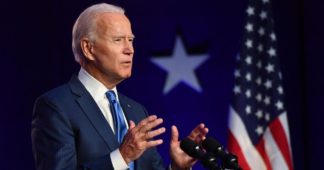Conversations with Scott Ritter and Michael Hudson
By Michael Welch, Prof Michael Hudson, and Scott Ritter
Global Research, March 26, 2022
“Joe Biden looked Vladimir Putin in the eye last June and threatened him with massive sanctions should he act on Ukraine. Sanctions like you’ve never seen before! … He had months to sit down with his inner circle and say, “how do we prepare for this?” Nothing the U.S. and its allies are doing has taken the Russians by surprise. NOTHING! They anticipated EVERYTHING! And they have a plan in response.”
– Scott Ritter (from this week’s interview)
Today, the dangers of military escalation are beyond description.
What is now happening in Ukraine has serious geopolitical implications. It could lead us into a World War III scenario.
It is important that a peace process be initiated with a view to preventing escalation.
Global Research condemns Russia’s invasion of Ukraine.
A Bilateral Peace Agreement is required.
An understanding of history is important.
It is absolutely essential that Freedom of Speech prevail as a means to resolving this crisis which potentially threatens the future of humanity.
Global Research, March 4, 2022
LISTEN TO THE SHOW
Click to download the audio (MP3 format)
The company BlackRock, Inc manages $10 trillion dollars in assets, and as such investors tend to place close attention to the views and opinions of chairman and CEO Larry Fink. Here is what he said in his recent letter to shareholders:
“the Russian invasion of Ukraine has put an end to the globalization we have experienced over the last three decades… Russia’s aggression in Ukraine and its subsequent decoupling from the global economy is going to prompt companies and governments worldwide to re-evaluate their dependencies and re-analyze their manufacturing and assembly footprints – something that Covid had already spurred many to start doing.”[1]
In other words, the spectacle of the last few weeks, and the response by NATO has had far-reaching ramifications beyond the aggression mustered by the United States as they invaded or devastated one country after another for years and years. Globalization is dead! A massive decoupling is taking place!
Indeed, the sanctions put in place to hurt Russia are hitting Americans, Canadians and the European communities too as we pull up to the gas station or watch our food prices start to escalate. [2][3]
Meanwhile, on Friday, President Biden, flanked by European Commission President Ursula von der Leyen announced an agreement to lower the European Union’s dependence on Vladimir Putin’s oil and gas supplies. According to Biden:
“We’re going to have to make sure the families in Europe can get through this winter and the next while we’re building the infrastructure for a diversified, resilient and clean energy future.”[4]
So the stakes for the Ukraine literally go far beyond the bullets, bombs and bravery of troops in the Eastern European country. While NATO still won’t engage them on the battlefield (let us hope) the many other financial measures levelled against Russia that are having consequences potentially as devastating as an actual war.
With Saudi Arabia now pursuing talks allowing some of it’s oil to be priced in the Chinese currency the Yuan, the dominance of the American dollar as part of the standard for maintaining its power is in jeopardy. As well, 5 nations including Russia itself rejected the United Nations General Assembly vote to immediately end Russia’s military aggression in Ukraine. The 35 nations that abstained did so, in many cases as suspecting that the West incited the conditions that led to the conflict. So Russia is not exactly “isolated.” [5]
Is a new divided world part of the New World Order that has been unraveled in front of us? This week’s Global Research News Hour makes an attempt to peek at the future of this gawd awful war!
In our first half hour, we are joined once again by US military intelligence officer and strategist Scott Ritter. He will assess the longevity of the Russian mission in Ukraine (not long by his standards), the role of President Zelenskyy calling for help NATO can’t provide, and the sanctions war which will hurt the U.S. and Europe far more than Russia.
In our second half hour, we will be joined by the great economic thinker Prof. Michael Hudson. He will explain the true strategy of provoking Russia’s war, describe the accelerating slide of the US currency, and what the dynamics of this new separation of states is going to play out.
Scott Ritter is a U.S. Marine Corps Intelligence officer, former UN Chief Weapons Inspector from 1991 -1998, and is currently engaged as a commentator and columnist on Huffington Post, consortiumnews and the American Conservative.
Michael Hudson is President of The Institute for the Study of Long-Term Economic Trends (ISLET), a Wall Street Financial Analyst, and Distinguished Research Professor of Economics at the University of Missouri in Kansas City. He is also the author of J is for Junk Economics from (2017), Killing the Host from (2015), and his 1968 classic Super-Imperialism: The Economic Strategy of American Empire. His website is michael-hudson.com
(Global Research News Hour Episode 349)
Transcript – Interview with Michael Hudson, March 24, 2022
Part One
Global Research: Great privilege to speak with you again Mr. Hudson. Welcome!
Michael Hudson: Thanks for having me on!
GR: Now, We’re seeing NATO unifying together behind the US call to sanction Russia, including removal from the SWIFT system. They’re being hit with sanctions to hurt, sanctions from hell as President Biden would say, and it doesn’t look as if it’s working. But the sanctions are boomeranging, and hitting the EU and the US pretty hard with soaring rates for food, fertilizer, oil and gas. They seem to provoke Russian aggression. He’s kind of compelled them to do that. We know it wasn’t the response, I mean it’s something they have been working on all along. But what really was the strategic goal of provoking Russia to go to sanctions war with Ukraine? Do they foresee Russia begging for mercy or is there more going on here?
MH: I think it’s just the opposite of what you said. The war isn’t against Russia. The war isn’t against Ukraine. The war is against Europe and Germany. The purpose of the sanctions is to prevent Europe and other allies from increasing their trade and investment with Russia and China, because the United States saw that the centre of world growth is not in America now that it’s deindustrializing. Following neoliberal policies since the 1980s has ended up hollowing out the US economy. And how on earth can the United States maintain prosperity if it’s lost the ability to do wealth creation?
The only way of maintaining prosperity if you can’t create it at home is to get it from abroad. And the attempt, beginning a year ago, by President Biden and by the US neocons, was to block Nord Stream 2, and failing that, to block all energy trade and other trade with Russia. So that the United States could monopolize it itself. One of the main tools for the last hundred years of US control of the world economy has been by the oil industry. Controlling world energy trade. Energy is the key to the GDP, the productivity and every country, and the thought of energy trade passing out of US control into that of other countries threatened the United States’ ability to turn off other countries.
So the provocation of war in Ukraine and the provocation of a US response has enabled the US to say, look at how awful the Russian is doing, it’s defending itself. Defending itself against the United States is a declaration of war. Because it means that you are breaking away from the dollarized system, and so by the thought that other countries have the potential of becoming independent was viewed at the United States as a challenge to the United States’ ability to dictate their policies and to use dollar diplomacy to take control of their commanding heights.
The fear of the United States of course is that the environmental movement would be able to move to stop global warming by slowing the carbon fuels, oil and gas, and so by creating this crisis in Europe, the United States has greatly…it bases its foreign policy on accelerating global warming. Accelerating coal and oil as the fuels of the future. I think President Biden in Poland today is promising Polish coal to replace Russian oil. And American coal. That’s why President Biden has Senator Manchin from the coal industry lobby as head of the environmental and energy agency.
So what you’re seeing is not the US backfiring and shooting it in their foot by creating a world crisis. That’s the idea! Because it realizes that in the world crisis, energy prices are going to go way up, benefiting the US balance of payments. Not only as an energy exporter, but the oil companies that control the world oil trade, once they exclude Russia from it, agricultural crop prices will go way up, benefiting the United States as an agricultural exporter, especially if they prevent Ukrainian and Russian wheat exports, and this is going to create a debt crisis for third world countries whose debts are coming due. And the United States can use this debt crisis to force them, or attempt to force them, if they go along with it, to continue privatizing and selling off their public domain to US buyers so they can sell off their patrimony in order to get the money to pay the debts to pay for the higher oil and food imports.
The US strategy is to create exactly the world crisis that you are presented as being accidental. You can be sure that these people read the newspapers enough to know that this is the obvious result of what they’re doing. Look at what they’re doing as deliberate. Don’t assume they’re dumb. They’re smart, they’re evil, but they’re not dumb.
GR: You know it’s quite a bit there, but I want to point out that in one of your articles you talked about basically three areas, economic areas, that seemed to be dominating things in the US right now. There’s the oil and gas sector, there’s the military-industrial complex, and then there’s the FIRE sector, finance, industry, and real estate. And I think all three of those areas are benefiting from the current situation. You can see this clearly. The levels, the rates of Raytheon and Lockheed Martin going up…
MH: Well, I’m not sure about the banks. Where did the banks’ interest end up in all this? Banks, since the 13th century, have made the bulk of their money on trade financing. Receivables, if you’re an importer of oil, you get a letter of credit so that the bank promises to pay when the delivery is made. Trade financing is a huge banking activity, and now, the US banks are locked out of this trade financing as long as it concerns Russia, China and probably the Belt and Road Initiative countries. So it’s hard to see how the banks are benefiting. Especially if the third world countries, the global south countries, say we are not going to sacrifice our economies and impose austerity just to pay for bondholders. The loans have gone bad, they’re odious loans, we’re repudiating. We’re not paying them.
That is not going to help banks and investors. So the banks seem to have taken a… They’re a beat behind in all of this. The war doesn’t seem to be economic as much as neoliberal, a visceral hatred of Russia, and a hatred of Germany also, among the neocons. And I think that’s, it’s not understood, but there’s this non-economic, almost a racist hatred at work here when it extends to China for instance. And the United States is, you don’t know what’s going to happen in anarchy. If there’s a financial war, and, the world is splitting into two economic blocs, it’s very much like a military war. You really don’t know what’s going to happen in anarchy. It’s brad-bag. The United States thinks that it has enough power by bribery, by force, by assassination, if need be, as some of the senators have called for, to get its way, but I’m not sure that that’s going to be met with simple passivity on the part of everybody who the United States declares to be an enemy.
GR: Well, Saudi Arabia recently announced it would be pricing oil in the yuan. That means that the dollar now has a competitor, I guess, when it comes to buying oil.
MH: Oil trade with China. Other countries are not going to do their trade in dollars because the United States can simply grab whatever dollar assets they have. If a country does something independent, as when Chile became, wanted to take control of the copper trade, under Allende, the United States can simply grab its money. When Venezuela thought to undertake land reform in the popular policy, the United States simply seized its money, and the Bank of England seized Venezuela’s gold. The United States simply seized Afghanistan’s foreign reserves before it seized Russia’s foreign reserves.
So all of a sudden, countries or afraid to keep, are afraid to use US banks, afraid to use any connection with the dollar, or to have any, anything available for the United States to grab, because that’s its policy now. That is what’s really driving other countries away. Even America’s allies must be frightened, because Germany is asking for its gold supply to be sent back to it from the New York Federal Reserve Bank in airplane loads.
GR: Yeah, so you are seeing sort of like a domino effect, I mean is the American dollar, it was already in some difficulty, but now, you can see that really accelerating as we continue, and in all of those other global south countries and other places that you mentioned, they’re going to ditch that and go with the other currency?
MH: The crisis is political. It’s not going with another currency. President Putin, in his speeches, said this war is not about Ukraine. This war is about restructuring the international order. And what that means is an alternative to the IMF. An alternative set of institutions to the World Bank. An alternative to the World Court. And an alternative to the US rules-based order based on the United Nations rules for instance, but that can’t be done as long as the United States is a member of that group.
So it means that there’s going to be a new grouping of international organizations, of which the United States will not join because it won’t join any organization that it does not have veto power in. So you’re going to have to parallel paths. You’ll have a neoliberal financialized, debt-financed path in Europe and North America, and you’ll have an industrial capitalism evolving into socialism path in China and the Belt and Road Initiative, Shanghai Cooperation Organization Block.
– Intermission-
Part Two
GR: I think that resolving Ukraine is sort of like a short-term deal, but the longer term is going to be in fact shaking Europe away from NATO and the United States degree of influence.
MH: United States is thoroughly in control of European politicians. The only opposition to NATO and the US in Europe is the right wing. The nationalist wing. The left wing is fully behind the United States and has been ever since, really the National Endowment for Democracy and other US Agencies really took control of the left-wing parties throughout Europe. They’ve Tony Blairized the European left, the Social Democratic parties in Germany and the rest of Europe, the labour parties in England, these are not labour and not socialist, they’re basically pro-American neoliberal parties.
GR: I know that Russia is very rich in mineral deposits, its rich in oil and gas as well. Russia and Ukraine form part of the breadbasket of the world. And as they control the important minerals like lithium and palladium and so forth, so they’re dealing with Ukraine, part of that plan, as a result you’re going to see, as I mentioned, a lot of impacts worldwide including food, and we’re probably going to start to see even food shortages pretty soon.
MH: That is the intention, You have to realize that this was anticipated. Without gas, already German fertilizer companies are going out of business because fertilizer is made out of gas, and if they can’t get their Russian gas, they can’t make the fertilizer, and if you don’t have the fertilizer, the crops are not going to be as prevalent and abundant as they were before. So all of this, you have to assume that, it’s so obvious, they knew this would happen, and they expect the United States to benefit from the cost squeeze that it’s imposing on food importers to the US benefit.
GR: I just want to get a sense of what the United States has to fight back with. I mean, they had the prestige of the dollar in their ability to make up things, but they also have control, through using, confiscating, for example, the gold and the deposits of the Russian government, the Russian Central Bank. Are these efforts going to be, is that the sort of thing that they have, I mean we could also talk later on about the actual military, but could you talk about those sorts of tools that the United States has to fight back against Russia?
MH: Well, the obvious tool is that’s used for the last 75 years has been bribery. European politicians especially are very easy to bribe. And most countries, just simply paying them money, and backing their political campaigns, meddling in other countries by huge financial support of pro-US politicians is the obvious way. Targeted assassination ever since World War II when the British and Americans moved into Greece and began shooting all of the anti-Nazis because they were largely socialists, and England and America wanted to restore the Greek monarchy. You have Operation Gladio in Italy, you have the targeted assassinations from Chile all the way through the rest of Latin America and its wake. So, if you can’t buy them, kill them.
Then there are various military forces. And the main tool that the US has tried to use is sanctions. If they can’t get their oil, or finance it in gas or food from Russia, then America can simply turn off their food supply. And turn off critical raw materials and interrupt their economic processes because there are so many different components that you need for almost any kind of economic activity…
The United States was looking for pressure points. And it is going to try to work on the pressure points, sabotage certainly, is another tool that’s being used, as you see in Ukraine. So the question is whether this attempt on pressure points is going to force other countries to, certainly it’s going to cause suffering. In the short term for these countries.
Over the longer-term, they’re going to see, we’re going to have to become self-sufficient in the main pressure points. We’re going to have to produce our own food. Not import our wheat. We’re going to have to shift away from growing export plantation crops and have our own grain, maybe return to family size farming to do all this. We’re going to have to produce our own arms, we’re going to have to have our own fuel sources, and that would include solar energy and renewable energy to become independent of the American-dominated oil and gas and coal trade. So the longer-term, even medium-term effect of all of this is going to make other countries self-sufficient and independent.
There will be a lot of interruptions, even starvation, a lot of property transfers and disruption, but over the long term, the United States will, is destroying the idea of a single interconnected globalized order because it’s separated Europe and North America from the whole rest of the world.
GR: How is… When it comes to dealing with the oligarchs in Russia, and what they’re facing with these sanctions, do they want the sanctions to be ended so they can get involved with the United States, or are they taking to Putin and a “let’s do it on our own approach?”
MH: In the past, the oligarchs were very western oriented because when they transferred Russia’s oil and gas and nickel and real estate into their own hands, how did they cash out? There wasn’t any money in Russia because it was all destroyed in the, after 1991 in the shock therapy. The only way they could cash out was by selling some of their stocks to the west. And that’s what Khodorkovsky wanted to do when he wanted to sell Yukos to, I think, the Standard Oil Group. And now that they realize that the United States can simply grab their yachts, grab their British real estate, grab their sports teams, grab the assets they hold in the west, they’re realizing their only safety is to hold it within Russia and its allied economies, not US-based economies where whatever they have in the west can be grabbed.
So yes today, or yesterday, Chubais left Russia for good and went to the west, and you’re having the oligarchs choose. Either they remain in Russia and look at their wealth by creating Russian means of production or they leave Russia, they take their money and they run and hope that the west will let them keep some of what they stole.
GR: Among the countries that are not going to be supporting the sanctions against Russia or China, India, Kazakhstan, Tajikistan, Kurdistan, I mean all those countries in the Central Asian region. And that seems to be benefiting the Belt and Road Initiative, I think.
MH: You’d think so. The big question mark is India. Because it’s so large. And India has already positioned itself to be the intermediary for a lot of financial trade financing with Russia. India is also prone to be pro-American. And Modi in the past politically has been very pro-American. But the fact is if you’re looking at India’s implicit national economic interests, its economic interests lies with the region it’s in. With Eurasia, not with the United States.
So the question is, I think within the Pentagon and the state department, their big worry is, how do we keep control of India in the US hands? That’s going to be the big crisis areas for the next few years.
GR: Maybe I’ll, maybe get you to put on your glasses to sort of looking ahead into the future. Maybe a couple of years from now. Given the prevailing trends, how is this going to play out? Is this, is it going to have one side advanced more than the other or is it going to be a nuclear husk? What is your thinking?
MH: I don’t think it’ll be nuclear, although it could, given the crazy neocons with their Christian fundamentalists in Washington, people like Pompeo thinking that Jesus will come if you blow up the world. I mean, these people are literally crazy.
I worked with National Security people 50 years ago at the Hudson Institute, and I couldn’t believe that human brains were as twisted as they were, wanting to blow up much of the world for religious reasons. And for ethnic reasons, and for personal psychology reasons. And these are the people that have somehow risen to a policy-making position in the United States, and they’re threatening not only the rest of the world, but of course the US economy as well.
But I don’t think atomic war is likely. I think that the United States is going to try to convince other countries that neoliberalism is the way that they can get rich. And of course, it’s not.
Neoliberalism impoverishes. Neoliberalism is a class war against labour by finance, primarily, and a class war against industry. A class war against governments. It’s the financial class really against the whole rest of society seeking to use debt leverage to control companies, countries, families and individuals by debt. And the question is, are they really going to be able to convince people that the way to get rich is to go into debt. Or are other countries going to say, this is a blind alley. And it’s been a blind alley really since Rome that bequeathed all the pro creditor debt laws to western civilization that were utterly different from those of the near east, that, where civilizations take off.
GR: And just maybe a final thought, I mean, I’m based in Canada, and it seems when I’m hearing about de-dollarization at the sinking of the US economy and how things are going to go for ordinary individuals, and I’m wondering if Canada can somehow escape that trajectory next to me or are we kind of manacles at the wrists, where the United States goes, we’re going there too?
MH: Canada is completely controlled by the banking sector. I wrote an article for the government’s think-tank, Canada and the New Monetary Order, in 1978, detailing how Canada was dependant. It’s very debt-financed, financially controlled, and its government is utterly corrupt. The neoliberal party, the liberal party there is fairly corrupt, and so are most of the other parties, and they look at the United States as protecting the corruption and economic gangsterism that enables them to control Canada.
GR: Well, Michael Hudson, I guess we’ve got to go now, but thanks for that very large and interesting discussion on our survival, how we survive this war, and what the consequences will be. Thank you very much for being my guest on Global Research.
MH: It’s good to be here.
The Global Research News Hour airs every Friday at 1pm CT on CKUW 95.9FM out of the University of Winnipeg. The programme is also podcast at globalresearch.ca .
Other stations airing the show:
CIXX 106.9 FM, broadcasting from Fanshawe College in London, Ontario. It airs Sundays at 6am.
WZBC 90.3 FM in Newton Massachusetts is Boston College Radio and broadcasts to the greater Boston area. The Global Research News Hour airs during Truth and Justice Radio which starts Sunday at 6am.
Campus and community radio CFMH 107.3fm in Saint John, N.B. airs the Global Research News Hour Fridays at 7pm.
CJMP 90.1 FM, Powell River Community Radio, airs the Global Research News Hour every Saturday at 8am.
Caper Radio CJBU 107.3FM in Sydney, Cape Breton, Nova Scotia airs the Global Research News Hour starting Wednesday afternoon from 3-4pm.
Cowichan Valley Community Radio CICV 98.7 FM serving the Cowichan Lake area of Vancouver Island, BC airs the program Thursdays at 9am pacific time.
Notes:
- https://www.blackrock.com/corporate/investor-relations/larry-fink-chairmans-letter
-
Emily Rauhala, Tyler Pager, Ashley Parker (March 25, 2022), “Biden, E.U. announce plan to reduce Europe’s reliance on Russian energy,” The Washington Post; https://www.msn.com/en-us/news/world/biden-eu-announce-plan-to-reduce-europe-s-reliance-on-russian-energy/ar-AAVtSsS?ocid=BingNewsSearch
We remind our readers that publication of articles on our site does not mean that we agree with what is written. Our policy is to publish anything which we consider of interest, so as to assist our readers in forming their opinions. Sometimes we even publish articles with which we totally disagree, since we believe it is important for our readers to be informed on as wide a spectrum of views as possible.











